- Home
- Yvonne Navarro
AfterAge Page 2
AfterAge Read online
Page 2
He pulled off his belt and knotted it around his right fist. A smart-ass, he figured. She'd probably heard the crack made by Mr. Mouth down the hall. Well, he'd purge her thoughts quick enough; the colors of respect were black and blue, and like a dozen others before her, she was about to learn the many shades of appreciation. As she backed away, he grabbed the chain that circled her ankle with his left hand and yanked her off her feet. The woman landed heavily on one hip and her yelp of pain changed to screams as his arm rose and fell.
Taking his pay in mid-shift would be too easy. He'd rather have a little fun first.
4
REVELATION 20:12
And I saw the dead, small and great.
~ * ~
Standing in the echoing pastel halls of Northwestern Memorial Hospital, Dr. William Perlman listened carefully. For a moment, he'd thought he'd heard something—ghosts? Maybe. He believed in them, oh yes, although eighteen months ago he would've laughed at anyone suggesting such a thing.
Of course, eighteen months ago the word vampires had meant Dracula and Christopher Lee.
Perlman was a tall man and the last ten months had taken its toll: his once-well-fed frame weighed a thin one-forty now that he had to forage food from the supermarkets and stores along the Gold Coast. Like his wife, Mera—who had disappeared over a year ago with their small son—he had taken their lifestyle for granted. He ached for Mera and what he had teasingly called her classic "Jewishness"; he often wondered if she would—or could—ever come back. And what would he do if she did?
He tucked his shirt into painter's overalls and pulled a comb from his back pocket from out of habit, running it through thinning hair the color of faded stone. Last night before bed he'd rinsed his face and found himself fascinated by his own flesh: living muscles expanding and contracting, oxygen-rich blood pumping through arteries, millions of fragile capillaries beneath the layers of skin. With a pang he'd also acknowledged that his body was dying—slowly and naturally—but dying nonetheless. He didn't want to die, ever. He wanted to live for a hundred years, or a thousand.
But not like that.
He touched his fingertips to the new crevices around his eyes and across his forehead, lines that he'd never noticed before. Mera had always kept her face bland, hiding her joy or sorrow in an endless attempt to outwit the wrinkles. Studying himself, he wondered if she hadn't been right; the once-deep smile lines around his mouth had all but faded over the past year Perhaps his cherished Mera had finally been successful in her search for eternal youth. . . .
He shook the thought away. Work boots clomping loudly in the deserted building, Perlman smoothed his bright red shirt and checked his pockets before unlocking the delivery door and slipping into the alley off Chicago Avenue. He glanced around cautiously, then pulled the door shut, hearing the reassuring click as the sturdy lock engaged. With the lake only a block away, the air was clear and vigorous as it fogged from his lips. A short jog west on Superior and he reached the crosswalk, looking up the instant the sun crept above the Barclay Chicago Hotel. In a microsecond one sun blossomed into a thousand as the rays caught and reflected on the rows of mirrored windows in one of the buildings bordering Michigan Avenue's west sidewalk. Perlman's breath hitched at the spectacular sight.
He pulled his gaze from the near-blinding display and light motes danced behind his blinking lids as he debated his direction. First, he decided, something to eat, a shot of carbohydrates and protein to bolster his daily vitamins. He turned north, staying on the east side until Water Tower Place rose in front of him, its proud white marble scoured clean by the spring rains and lake winds and almost painful to view. He tried the glass doors futilely and peered inside; he could see little besides shadows and the muted shine of chrome-edged escalators climbing into the dimness.
Shrugging, he turned away; shattering the doors would only open the Tower to nature's destruction. A glint of metal caught his eye and he returned and squatted by the doors, nose pressed against the glass as he struggled to see. There was a wide strip of tarnishing brass at the bottom, a toe kick, and just inside he could barely glimpse the edge of some sort of locking rod; at night it would be invisible. Hope rose in him and he touched his palms to the glass tentatively. Were there people inside? Even just one? He spent five minutes knocking on the thick glass and bruising his knuckles before he gave up, resolving to keep a closer eye on the Tower; the metal rod was much the same as the one he used across the entrance at Northwestern, though with glass doors it was only the sly illusion of an abandoned building.
Perlman slipped into Walgreens through a door he'd carefully jimmied some months ago; inside he saw further evidence of life in the food section where the shelves had been rifled for supplies, though nothing was wasted by vandalism or carelessly ripped packages. He had food at the hospital and now took only to satisfy his immediate appetite; two cans of sardines and a small box of stale Ritz crackers. Outside he sat on the curb, ate, and watched the sun climb a little higher in the sky, letting his eyes wander repeatedly to Water Tower Place and its imagined occupants. As usual, his hunger died after a few bites; he stubbornly finished the sardines and crackers, then pocketed the other tin before dropping his garbage into a rusting trash can on the corner. More habit—it was amazing that such an ingenious, predictable man such as himself had survived in this back-assward world.
Perlman chewed the last bite of oily fish and swallowed it with difficulty, then stood, stomach fluttering uneasily. Tied in the hammer loop of his overalls was a coil of strong polypropylene rope; in his bulging pockets were duct tape, a heavy Mag- Lite flashlight with good batteries, a Schrade Lockback hunting knife and four thick plastic garbage bags. He could get the two-by-fours he'd need from the construction sites along Michigan Avenue. Then it was just a matter of searching a few dark storerooms and basements until he found what he wanted.
He was about to blow his predictable life to hell.
~ * ~
Knife in hand, Perlman sawed a generous length of rope and braced himself to enter the three-flat on the corner of State and Pearson. It hadn't taken long to choose, and he was certain there were scores of others around that would have been suitable. He'd doubled back to the construction site at 700 North Michigan, a massive jumble of open ironwork and granite slabs that would be forever incomplete. There he'd picked two sturdy lengths of wood, carrying them on his shoulders before finally stopping in front of this forbidding three-story brick. His eyes swept the structure, noting that the basement, second- and third-floor windows were shut tight against the elements. The upper floors might be simple coincidence, but boards had been leaned over the basement windows and the first floor's destroyed picture window told another tale; Perlman shuddered as he imagined the family that must have cowered inside and their terror at hearing it shatter, then looking up to see—
He blinked and forced himself back to the present. Bad enough that ragged drapes fluttered in and out of the opening as though the building were breathing; now he was reliving by proxy the horror that had probably occurred there. He was breathing in fast, shallow gasps and he forced himself to slow down before he hyperventilated. He was not particularly brave and what he was about to do pushed beyond limits he hadn’t known existed.
At the top of the stone steps, Perlman stopped and cut four generous lengths from the roll of duct tape, patching the sticky strips together so that they formed a square sheet—his first protection. Bile crept up his throat and his hands began to tremble as soon as he touched the knob; if it had been anything but the sticky tape in his hands he would have dropped it. Swallowing, he pushed through the unlocked door into the foyer.
It had once been an expensive building. There was a metal stop on the bottom of the entry and Perlman toed it into position to keep the door from closing; the door itself, inlaid with large panels of rich stained glass, threw the hall into colorful shadows. To his right was another open door beyond which he could see stairs leading to the upper floors; mild daylight fil
tered from the grimy windows on each landing, enough to discourage anything from hiding in the empty apartments. But the door on the left held his attention. Once inlaid with the same stained glass as the others, now it was impossible to tell if the window was even intact beneath the plywood stacked in front of it. When he moved the wood, he found the doorknob still in place though it was only a formality; gouged into the wood where a small lock had been were deep grooves. When Perlman touched the knob, the door swung open all too obligingly.
A heavy smell of dampness and decay saturated the air. Beneath the stench Perlman's senses detected something worse as he descended the stairs and tried to breathe through his nose. The hall's watery light carried only a few steps before he reached for the flashlight; its glow was little comfort in the deepening blackness. Nerves screaming, his leg jarred when the steps ended unexpectedly and he swung the flashlight in a jittery arc around the room to make sure he wasn't standing on top of something he wasn't yet prepared to meet. He was taking an incredible chance. He knew almost nothing about what vampires could or couldn't do, when they could do it—nothing. Perlman's survival these past months had been based on two principles: stay well hidden at night and stay out of dark places. For all he knew, the cursed things could rise during the day as long as the room was dark. Well, he'd soon find out.
He played the light around more slowly; the basement was smaller than he expected and the beam picked up everything from cardboard boxes and newspapers to a bicycle slowly corroding in the dank air. From his position it was easy to see across the room, where a set of weights had been scattered at the foot of a beat-up antique wardrobe whose wood was even blacker than the mildewy wall behind it, and Perlman's heart skipped. He'd been half-hoping not to find anything; then he could run safely back to the hospital and its white-walled security and firmly pledge to try again another day. He'd never been a procrastinator, but fear was doing odd things in his head and he looked longingly at the staircase with its faraway dribble of daylight before forcing himself to cross the floor, clearing a path from the stairs to the wardrobe.
The sounds he made as he pushed aside a bundle of magazines seemed as loud as a symphony and he wondered if they could hear in their sleep. By the time he was standing within a few feet of the cabinet, he was shaking so badly he almost couldn't breathe; each step made the air in the basement thicker and so filled with evil that he didn't want it in his lungs anyway. The hair at the back of his neck, stubby from his awkward homemade haircuts, was standing so high he could have been moving through a field of static electricity. His hands, pale, slender, and defenseless—a surgeon's hands—shone in the back glow of the flashlight. Could he actually go through with this?
Clutching the tape and rope, he watched in absent-minded horror as his other hand pulled open the wardrobe's door.
Thick, vile air spilled out. His heart pounded fiercely in his chest and at first he thought his blood pressure had escalated so dangerously that he'd lost his eyesight, because even with the flashlight he couldn't see anything inside the cabinet. Then he realized he was gazing at a filthy blanket nearly as black as the wardrobe's interior. Before his courage could flee, he yanked the blanket aside.
"Oh!" he whispered as he stared face-to-face with a child of about four years old. The boy's naked, dirty skin was a deep, emaciated gray, and twined on his sunken chest were sticklike fingers from which sharp, blackened nails curled. Unwittingly, Perlman's gaze met the vampires; beneath bloodless, translucent lids, unholy brown eyes sparkled up at him.
Daddy? The sweet voice in his mind was that of an innocent preschooler. Please hold me. I'm so cooold. . . . Behind Perlman's eyes formed a vision of this child as he had once been, and for an instant he imagined he'd found the boy alive, skin pink with health but shivering, brown eyes gazing at him trustingly. Daddy . . . please help me, it said, and Perlman's heart nearly broke.
His body moved on its own and he began to bend, intending to pull the poor, tiny body into his warm arms. Beneath the pitiful cries swirling in his mind, Perlman sensed a building eagerness that caused his pounding pulse to stutter.
He stepped forward and reached—
Another step—
His right foot cracked into a twenty-pound weight lying just under the front of the wardrobe and he cried out as sanity-bringing pain rocketed up his foot and ankle. His face—which had been only a half foot from the boy's jerked up and away as his fingers fumbled with the tape and slapped it over the creature's face. The agony climbing up his leg was an immense thing competing with the voice that still rang in his head—a voice that had gone from childish cajoling to fading screams of rage as he leaned back against the wall and panted for breath. When he realized that he'd almost become a human pacifier for this miscreation's daytime nap, the sardines and crackers he'd eaten earlier exploded from his throat in a smelly, wet mess across the weights at his feet.
His leg almost buckled as he took a step and Perlman wondered what damage he'd done to his foot. Moisture trickled into his eyes and he swiped at it with the back of his hand as he pulled out two of the garbage bags and tucked one inside the other; grimacing, he leaned back into the wardrobe and tugged the bags over the vampire's head and skeleton-like torso. As he worked the plastic around the frigid body, the voice tried to squirm into his mind again and he purposely ground his foot into the floor, hissing through his teeth as the pain cleared his thoughts. Even with a busted foot it didn’t take much to lift the boy from the wardrobe and draw the other bags around it from the feet up.
The child weighed little and normally Perlman could have simply tossed him over a shoulder and gone on his way. As he tied the plastic tightly around the boy he was grateful that he'd brought the two-by-fours, though he'd done so because he'd assumed his captive would be an adult and considerably heavier. Now he placed a wood piece at each side of the creature and ran the thick duct tape around and around, twisting and circling until he was certain the body wouldn't slide down and scrape against the ground as he dragged it. With the extra length of wood at one end, he could pull it down the street like a travois.
He was never so relieved to see daylight as when he finally hauled his burden down the porch steps of the three-flat. Each time the wood bumped from one riser to the next Perlman felt the vibration run up his arms and travel to his injured foot. His head ached, his stomach churned, and his foot throbbed, and to make matters worse, when he crossed the street and came out from beneath the tree shadows into the sun, the thing in the garbage bags began to try and wriggle free. With the amount of tape and rope wrapped around it, Perlman thought the boy could have undulated for a week and not gotten loose, but it was a spooky thing to witness and he tried to hobble faster and get the vampire back to the hospital as quickly as possible. The way it was writhing it seemed the sun's rays were going through the dark green plastic as though it were mesh. It had felt like hours inside but the sun, springtime bright and strong, had just reached its axis and Perlman relaxed, knowing he could still count on hours of daylight.
But he wondered what tonight would bring.
5
REVELATION 6:12
. . . and the moon became as blood.
~ * ~
Deborah Nole's teeth ached from being ground together for the last three hours, yet every time she tried to relax, her teeth started chattering; in the empty auditorium the sound was machine-gun loud.
Dammit! Why was she awake? Exhaustion usually made her sleep through the night, oblivious to her usual fear of the dark and the creatures that now owned it. Tonight her eyes were open uselessly in the blackness, lids stretched wide as if they could re-form into extra ears with which to search the cavernous room for sounds. She could detect nothing, and she was pretty good at it. More than pretty good—she'd managed to stay alive when countless others hadn't. But the heavy drapes that hung between her cot and the back wall could be a double-edged benefit: while her own sounds were muffled from the hundreds of empty seats surrounding the stage, the stea
lthy steps of an intruder would likewise be easy to hide. What time was it? Frozen in the same position for so long her arms had gone numb, Deb was afraid to even finger the light on her wristwatch and she could no longer feel the reassuring pressure of the twelve-gauge next to her. For all she knew the shotgun was balanced on the edge of the cot and would clatter to the floor if she reached for it.
How long? This was driving her insane; she had to know what time—wait! Her breath hitched at an imagined sound and the muscles of her arm unlocked automatically as her hand slid down and closed around the stock of the Winchester. Her stomach tightened, then acknowledged the fullness of her bladder, a sure sign that she'd made it to another dawn.
Her lungs emptied in relief and she grasped the gun and sat up, still shaking as she groped for the matches and oil lamp; a few seconds and a warm, welcome glow lit the backstage alcove. She took the lamp and climbed the carpeted steps around the banisters, caution returning at the first entrance as she pushed the bar down and felt the lock release. As she eased out of the Arthur Rubloff Auditorium, weak daylight filtered down the stairs from the dining room on the second floor. The building's noises had still terrified her a year ago, but eventually Deb had learned to recognize the daily creaks and groans as the sun brought the temperature up and caused the old mortar and stone to expand. But Deb listened for other noises, such as the stealthy steps of someone who'd managed a way inside. Although she daydreamed about it often, she really didn't know what she'd do if that ever happened, and it had been six months ago in October since she'd last seen a living person outside. His name, he'd said, was John, and he was as ragged and thin as they came. She'd greeted him eagerly and together they'd gathered another cot and blankets, more food and fresh clothes. After months of cowering alone, this man was a godsend of potential security.

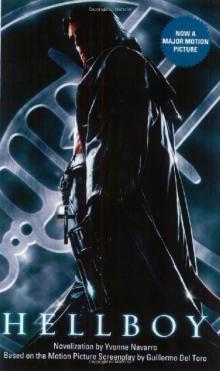 Hellboy
Hellboy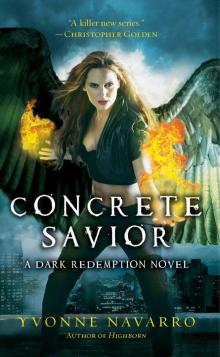 Concrete Savior
Concrete Savior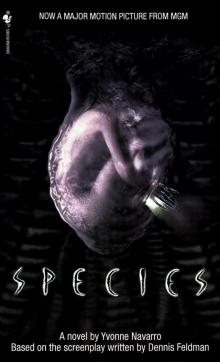 Species
Species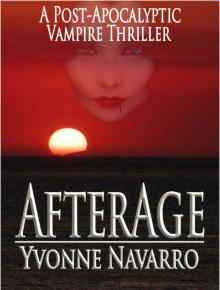 AfterAge
AfterAge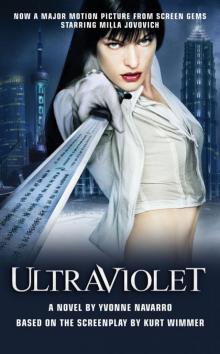 Ultraviolet
Ultraviolet Highborn
Highborn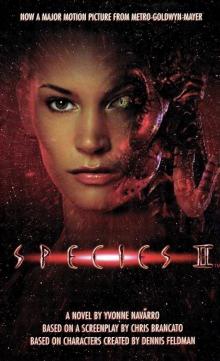 Species II
Species II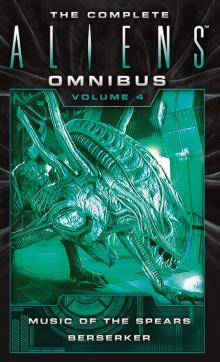 Aliens Omnibus 4
Aliens Omnibus 4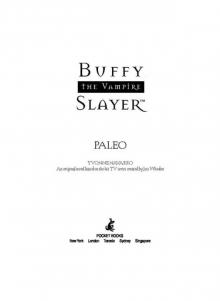 Paleo
Paleo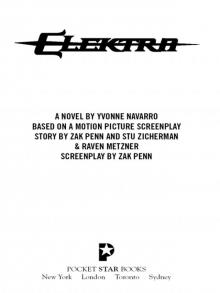 Elektra
Elektra